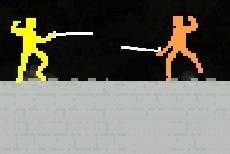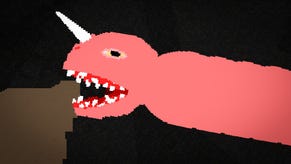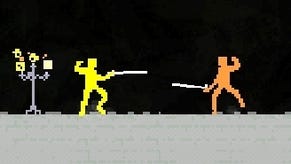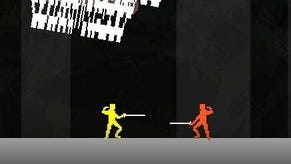Nidhogg review
The artist's debut ¨¦p¨¦e.
The wait's over! Finally, after three years, confused PC gamers the world over can actually buy Nidhogg, the legendary 2 player duelling game first commissioned by New York University's Game Centre. This commercial release is a robust thing, boasting four levels, rudimentary single player, mostly-functional online play, tournament mode and a host of comedic variants. I can't recommend boomerang swords highly enough.
Nidhogg's shimmering reputation is deserved, and there are a couple of ways to explain it.
The first is that it's a thing of exquisite craftsmanship and sleight of hand, tucking a wealth of play into each player's directional arrows and two buttons. Each player spawns with, but won't necessarily keep, a fencing sword. Tap up or down, and you'll swap to a high, medium, or low stance. The attack button sees you thrust with it, and changing stance while your opponent is thrusting to bring your sword up or down into their thrust disarms them. Most importantly, though, so much as brushing against a sword means instant death. Every single fight is hold-your-breath tense, and fights that last more than just a few seconds take on an air of majesty.
I'm at the risk of sounding like a manual, so I'll stop being so specific, but players also get access to leaps, sweeps, rolls, flying kicks and showboating cartwheels. All attacks happens quickly but have an easy counter (thrown swords bounce off a medium or high sword, for example), which means every kill is something to be proud of, and every death something to be ashamed of, rather than annoyed about.
But killing is almost irrelevant, because you only win by sprinting all the way past the other player, through screen after screen, to the room where the titular Nidhogg - a vast, flying worm - resides and will gobble you up to the delight of a cheering crowd. So you actually win by moving - snatching up a dozen more yards of the level before your opponent respawns.
That's clever for a host of reasons. It keeps fights fresh, because each one takes place in a different environment than the last, as you come skidding (or cartwheeling, soaring, rolling) to a stop in an area with a ledge, a gap, a chandelier, a door, tall grass, a travelator, a window, some squirrels, some fog. You rarely know quite how or when your pointy little opponent is going to respawn, either. And finally, it makes a round of Nidhogg tense from start to finish, because comebacks are only ever a couple of kills away. There's no slow dredging of points out of the ether. A player that's losing can always come back from the very brink of their Nidhogg's chamber, so in the ludicrous tradition of Errol Flynn, rounds will go back, forth, back, forth, BACK, FORTH, BACK, until some laughable mis-jump drops a player through a gap in the level like a stone, and their opponent can sprint the final five yards for their edible touchdown. And of course, since the individual fights in Nidhogg have no set length, we get an unpredictable game of rallies within rallies, of surprise victories within surprise victories.
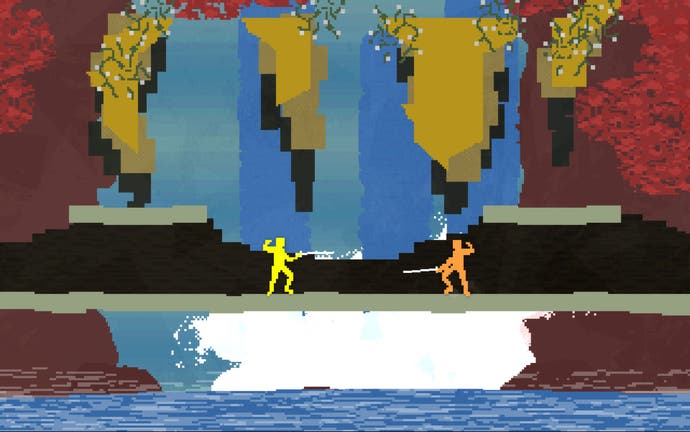
But there's another reason for Nidhogg's reputation: something the very best local multiplayer games have in common, from Bomberman to Johann Sebastian Joust. It's that Nidhogg is theatre, both for the contestants and for anybody watching.
This goes beyond the game's fluid animation and fantastic, per-level soundtrack. Moves in Nidhogg have personality. Waiting for your opponent at the cusp of a trap, letting them sprint towards you on a travelator? You become a villain. Running around with your sword held over your head makes you a fool. Chucking your sword at your opponent is a madman's gamble, voluntarily disarming yourself because it might pay off. And if it does, picking your sword back up by cartwheeling over your opponent's corpse can, and will, elicit shouts from your friends.
The game's visual language is so clear that it's always apparent who's being a jerk, which moves are skilful, and who's the underdog. And on a personal level, I love it for allowing me to perform something I haven't done since I was obsessively playing Action Half-Life every night. The act of throwing away your weapon, and signalling for your opponent to do the same with a few air punches. Nidhogg's unarmed combat is a scrappy thing of repeated flying kicks, but no less brutal for it. You can finish a downed opponent with a sharp twist of their neck.
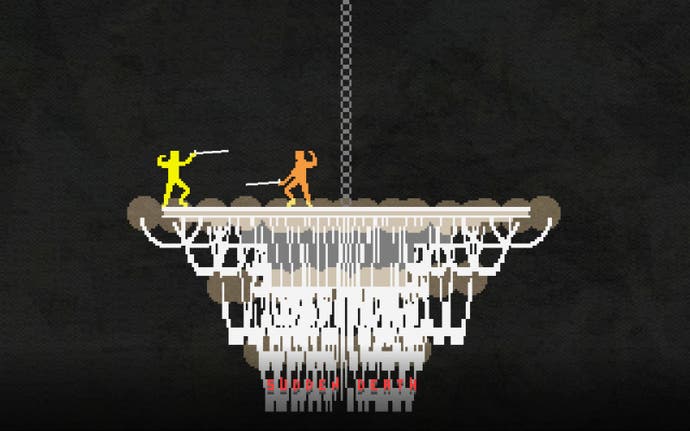
As to the quality of the commercial release, it shouldn't disappoint anybody. The new levels feel rich and generous, and will absolutely reinvigorate the game for anyone who played it to death at indie gaming events. All the new features are as interesting as they are entertaining, from tall grass that hides players entirely, to crumbling clouds, to the aforementioned travelators; only some low ceilings in the Mines level force players into colourless, if tense, sword fights.
Tournament mode and big picture mode are welcome, and while online play is prone to (and ruined by) occasional latency, its appearance in a game built for local play felt generous to me.
On the subject of generosity, the last thing to cover is Nidhogg's price. A contentious £12 when you can comfortably see all the content in 30 minutes is causing some debate. But this isn't unheard of. It puts Nidhogg at the same price as the similarly excellent local multiplayer game Samurai Gunn. In the greater context of indie game pricing, Nidhogg may seem ungenerous, but perhaps it's time to begin viewing it in the context of highly specific, "boutique" multiplayer games.
Besides, there are worse things in life than being encouraged to get your money's worth from Nidhogg; to put the TV somewhere everyone can see it, to get some pads linked up and throw a local multiplayer party. Rounds of Starwhal: Just the Tip and Samurai Gunn, leading up to a Nidhogg tournament? That evening would be priceless.
